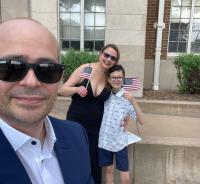When the U.S. Supreme Court ruled unanimously in May 1954 to end legal segregation in public schools, it established one of the most fundamental precedents in the nation’s history.
The Brown v. Board of Education National Historical Park in Topeka thus proved a fitting location — right before Independence Day — for a naturalization ceremony where participants swore to “bear true faith and allegiance” to the Constitution and the laws of the United States.
Johnson Countians Monica Fracachan Cabrera and Juan Calderón Táriba took part in that proceeding. The married couple’s participation marked a milestone for them and for the Library’s free U.S. citizenship class, established three years ago by Latino Services Outreach Librarian Christine Peterson.
The Library class now counts 18 new U.S. citizens among its alumni.
The couple credited Peterson and the class for providing the materials and the structured curriculum that prepared them for the rigors of becoming citizens, which starts with a 20-page application through the U.S. Citizenship and Immigration Services.
Applicants must also demonstrate an ability to read, write, and understand English and pass an oral civics exam with 10 questions selected from a 100-question study guide.
The Library offers the citizenship program three times a year. The program generally runs for about 15 weeks with weekly 90-minute Zoom sessions on Tuesday mornings and Wednesday evenings.
Peterson said the number of attendees is growing. She has approximately 30 people enrolled this trimester.
Originally from Venezuela, Cabrera and Táriba arrived in the United States six years ago after winning a visa lottery system to enter the United States. After spending time in Colombia, they settled in Johnson County because they had family in the area.
Their 12-year-old son, Daniel, is a middle schooler in the Blue Valley School District.
Cabrera is a research assistant for JUNTOS - Center for Advancing Latino Health at the University of Kansas, and Táriba is a mental health language coach at Children’s Mercy Kansas City.
Through Peterson as a translator, Cabrera explained why she and her husband consider it significant to become U.S. citizens.
“It’s important because this is our second home. We weren't born here, but we probably will die here,” she said. “This country opened up its arms to let us come in, and our son is now going to have those opportunities, especially in education. Maybe my grandchildren will even be born here, but we now have a voice, and we can vote, and we can participate in the government.”
Peterson conceptualized the citizenship program when a friend asked for her assistance in becoming a citizen. Peterson was also encountering Latinos who wanted help preparing to answer the citizenship questions.
Having lived abroad, Peterson knows the limited rights citizens have in other countries. Immigrants who come to the U.S appreciate the freedoms they have here, she said, and Peterson enjoys adding context to what the candidates already know.
“I do not want them to memorize 100 questions and spit out the answers,” she said. “I want them to know the meat of the country.”

